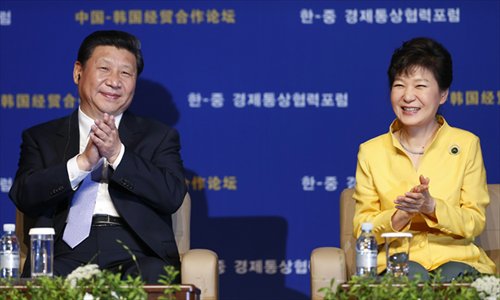China, SK share Japan concerns
Historical atrocities on agenda as Seoul trip ends

Chinese President Xi Jinping and South Korean President Park Geun-hye attend a business forum in Seoul on Friday. Photo: AFP
Drawing on their shared experiences of Japanese imperialism, China and South Korea voiced concern over Japan's whitewashing of its wartime atrocities on the last day of President Xi Jinping's visit to Seoul.
Before concluding his two-day state visit, Xi held another meeting with South Korean President Park Geun-hye and exchanged opinions over Japan's recent moves.
"[Park and Xi] agreed that it is worrying that Japan's attitude toward revising history continues as it even seeks to expand its right to collective self-defense," Ju Chul-ki, South Korea's senior presidential secretary for foreign affairs, was quoted as saying by the Yonhap News Agency.
"The two leaders also agreed that it is regrettable that Japan appears to be attempting to damage and play down the Kono Statement in practice, even though it has said it will uphold it," Ju said, according to Yonhap.
The Kono Statement refers to an official apology made in 1993 by Japan's then chief cabinet secretary Yohei Kono on the "comfort women," which acknowledged that imperial Japan had been involved in the recruitment of more than 200,000 young women and forced them to serve in military brothels.
On June 20, Japanese Prime Minister Shinzo Abe's cabinet unveiled the results of its reexamination of the Kono Statement. It said the South Korean government had intervened in the wording of the apology, implying it was the result of closed-door political dealings.
In a joint statement released on Thursday, China and South Korea agreed that their historic bonds should be treasured, and vowed to carry out joint research on historical issues including comfort women.
Earlier on Friday, in a visit with Xi, South Korea's National Assembly Speaker Chung Ui-hwa said the realization of lasting peace in Northeast Asia must be based on a common understanding of history. He added that South Korea's National Assembly proposed setting up a joint committee on historical studies among South Korea, China and Japan to exchange thoughts about historical issues and establish a correct view of history.
During the visit, Xi also proposed the two countries could jointly hold memorial activities next year, which marks the 70th anniversary of the victory of the War of Chinese People's Resistance against Japanese Aggression and of the liberation of the Korean Peninsula from Japan's colonial rule.
According to Ju, Park Friday responded to the proposal by saying Seoul also plans to hold "meaningful events," reported Yonhap.
Yonhap regarded such actions as the two forging a united front against Japan's increasingly militaristic moves.
Beijing and Seoul each have their own territorial disputes with Tokyo, and are wary about Japan's attitude toward its militarist past. Since 2012, a previously annual trilateral summit hasn't been held due to the disputes.
"China and South Korea's coordinating of stance and mutual support on historical issues will help contain Japan's right-leaning acts," Liu Ming, a research fellow with the Institute of International Relations at the Shanghai Academy of Social Sciences, told the Global Times.
According to Liu, the two sides could reach the goal by voicing their stance in official documents, supporting each other at multilateral venues, joint research, and jointly compiling and publishing history textbooks.
"However, the US, which values its alliances with both South Korea and Japan, might not be willing to see Seoul siding with Beijing on the issue. It may try to contain such cooperation," Liu noted.
Also on Friday, Xi gave speeches to a bilateral business forum attended by some 450 business leaders and to college students.
During the speech at Seoul National University, Xi elaborated on China's values, saying the country would always safeguard peace, promote cooperation and keep a humble manner.
While Xi has been pushing political and economic cooperation with the South, the First Lady, Peng Liyuan, was engaged in cultural diplomacy.
According to Yonhap, Peng Thursday toured Changdeok Palace and expressed interest in Korean culture.
During the tour, she recalled the 2003 South Korean TV series Jewel in the Palace, and said such TV programs helped the two nations' young generations develop an understanding of each other's cultures.
She also reportedly said Xi had some resemblance to the protagonist in South Korea's recent hit TV drama My Love from the Star, when he was young.
To honor the First Lady, who is a famous singer in China, South Korea had a children's choir perform one of her songs at the state dinner on Thursday.
Xinhua contributed to this story